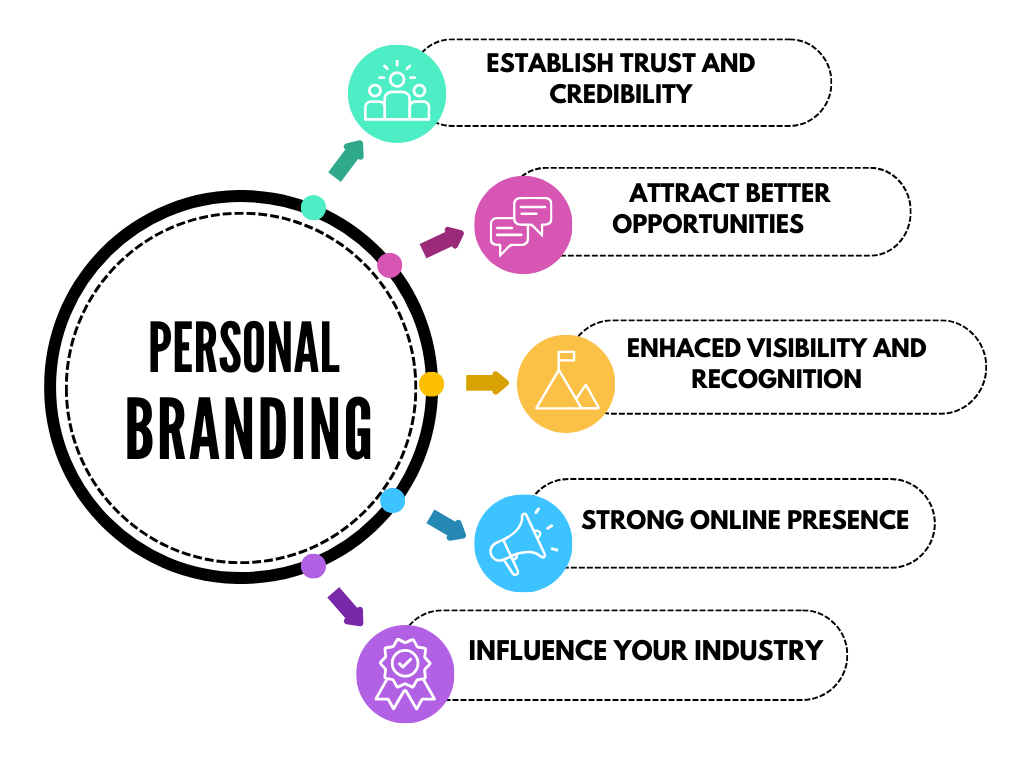For professionals hoping to stand out and accomplish their objectives in the highly competitive world of today, building a strong personal brand is crucial. A person’s personal brand is the distinct set of abilities, experiences, beliefs, and reputation that make them distinctive; it goes beyond their job title or LinkedIn profile. Deliberate tactics are needed to create a powerful personal brand that guarantees consistency, exposure, and trustworthiness.
Choosing a core message is an important first step in creating a personal brand. To do this, one must identify the precise knowledge, passions, and principles with which they wish to identify. A targeted message aids in crafting an engaging story that appeals to target audiences. For instance, a creative professional would prioritize uniqueness and narrative, whereas an entrepreneur might prioritize innovation and problem-solving. Building a unified brand identity starts with a well-defined core message.
Another crucial tactic for personal branding is creating an online presence. In the current digital era, personal websites, LinkedIn, and Twitter are essential resources for demonstrating competence and interacting with larger networks. Sharing information often helps to sustain exposure and strengthens the personal brand. Examples of this include project updates, thought leadership pieces, and industry insights. The brand is kept identifiable and reliable by maintaining consistency in tone, imagery, and messaging throughout different media.
The importance of networking in personal branding is equally significant. Attending industry events, collaborating on projects, and interacting with experts in one’s area may all greatly increase the reach and legitimacy of a personal brand. The reputation of the brand is further enhanced by the potential for mentoring, collaborations, and recommendations that arise from developing sincere connections. A person’s influence and authority are increased when they actively participate in professional groups, positioning them as significant contributions.
Another effective strategy involves leveraging storytelling to humanize the personal brand. Sharing experiences—whether successes, challenges, or lessons learned—allows others to connect on a deeper level. Authentic stories create relatablity and inspire trust, which are essential elements of a compelling personal brand. By aligning personal narratives with professional goals, individuals can leave a lasting impression on their audience.
Authenticity must always be upheld during the personal branding process. Authenticity guarantees the brand’s long-term viability and builds trust. Inauthentic personas or talent misrepresentations may result in temporary benefits, but they might eventually damage the brand’s reputation. In addition to boosting self-esteem, remaining loyal to one’s values and skills draws in possibilities that complement the brand’s guiding ideals.
Strategies for personal branding should also include ongoing education and training. Adopting innovation, learning new skills, and keeping up with industry trends show flexibility and a dedication to development. Credibility is increased by these attributes, which also show others that the person is progressive and able to change with the times. The basis of a personal brand is strengthened by consistently making investments in self-improvement.
A personal brand plan should include both measurement and refining. Frequent evaluation of the brand’s efficacy—by means of feedback, engagement measures, or career achievements—offers insightful information about areas that require development. Maintaining the relevance and effectiveness of the personal brand requires modifying tactics in response to changing objectives or market developments.
Other methods to strengthen a personal brand include mentoring and community service. In addition to increasing brand awareness, sharing expertise, helping up-and-coming professionals, or supporting social concerns positions the individual as a thought leader with a clear mission. By strengthening the brand’s value to others, these initiatives have a beneficial knock-on impact.
To conclude, having a strong personal brand is a great way to succeed professionally. Building a powerful and long-lasting brand requires tactics like coming up with a core message, creating an online presence, networking, using storytelling, being true to yourself, and embracing lifelong learning. Frequent evaluation and improvement increase its efficacy even further. The brand’s influence is further enhanced by giving back to the community via assistance and mentoring. By making an investment in these personal brand tactics, people may differentiate themselves in their industries, create deep relationships, and open up new growth prospects.

